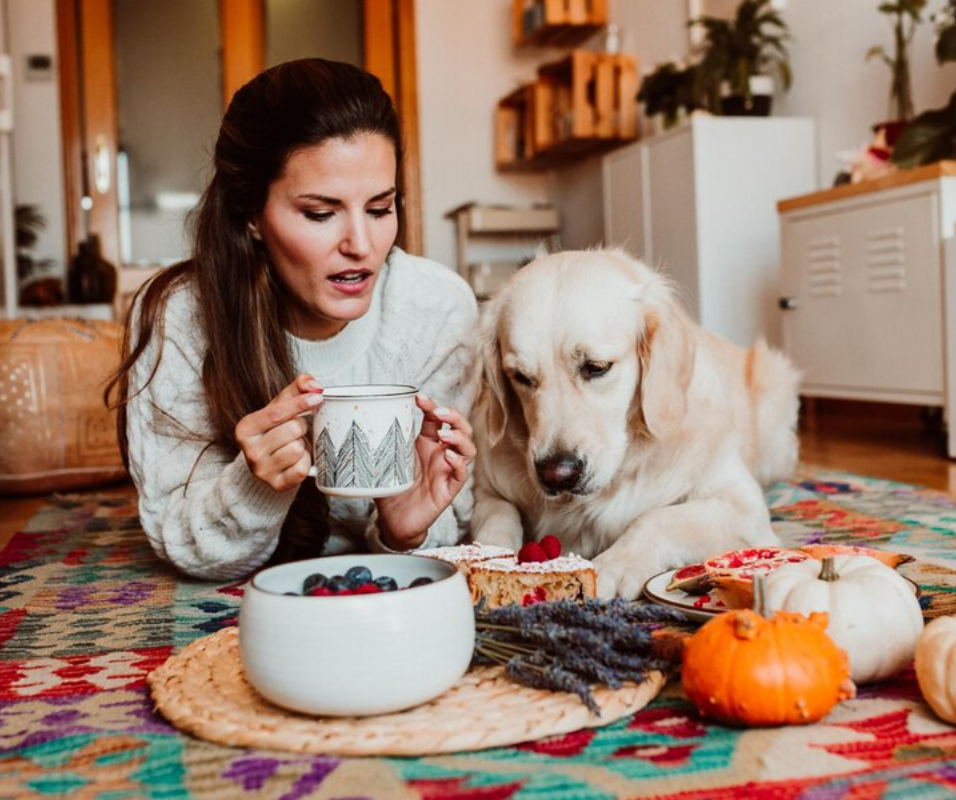Does your dog eat sunflower seeds without any problem? Find out what you need to know before sharing your snack!
Many pet owners are interested in feeding their dogs sunflower seeds. But before you share your snack, it’s important to understand whether these seeds are safe and healthy for your furry friend.
In this post, we’ll explore the safety of sunflower seeds for dogs and compare them with other great options to help you choose the best snacks for your canine companion.
Can Dogs Eat Sunflower Seeds?
Pet owners often consider Sunflower seeds, a popular human snack, as a potential treat for their dogs. However, several factors must be considered to determine whether these seeds are safe for pet consumption.
1. Nutritional Benefits
Sunflower seeds for dogs are a good source of carbohydrates, fat, plant-based protein and dietary fibre. They’re also a rich source of B vitamins, vitamin E, magnesium, manganese, phosphorus, iron, and zinc. And not forgetting antioxidants and flavonols, those little beauties that help make sunflower seeds so good for canine heart and cognitive health.
2. Possible Dangers
If your dog does get ahold of sunflower seeds still in their shell, watch out for signs of digestive distress. One or two likely won’t cause an issue if your dog can swallow them easily, but a few mouthfuls could cause an upset stomach or intestinal blockage.
3. Experts Opinion
While sunflower seeds offer nutritional benefits, such as healthy fats, protein, and essential vitamins, they should be given to dogs with caution.
Many veterinarians advise that sunflower seeds can be a healthy addition to a dog’s diet, but only if they are unsalted and in moderation.
Different Types of Sunflower Seeds
Before sharing sunflower seeds with your dog, it’s important to understand the various types available, as not all are safe or suitable for canine consumption.
1. Raw vs Roasted Sunflower Seeds
- Raw
Raw sunflower seeds are a safe dog food source that provides nutritional benefits without any harm.
- Roasted
Roasted sunflower seeds are not recommended for dogs because they contain extra oil and salt, which can cause digestive issues and reduce their nutritional value.
2. Hulled vs Un-Hulled Sunflower Seeds
- Hulled
Hulled sunflower seeds are suitable for dog food as they do not risk choking or indigestion to dogs.
- Un-Hulled
Un-hulled sunflower seeds can be dangerous to feed to dogs, as they can cause choking and gastrointestinal problems, and should generally be avoided.
3. Organic vs Non-Organic Sunflower Seeds
- Organic
Sunflower seeds, produced in a natural environment without chemicals or fertilizers, are a suitable and safe food for dogs and provide high nutrition.
- Non-Organic
Non-organic sunflower seeds are produced with chemicals and pesticides that can be dangerous to dogs’ health, making them more affordable or potentially dangerous.
Best Sunflower Seed Products for Dogs
1. Pumpkin Seeds
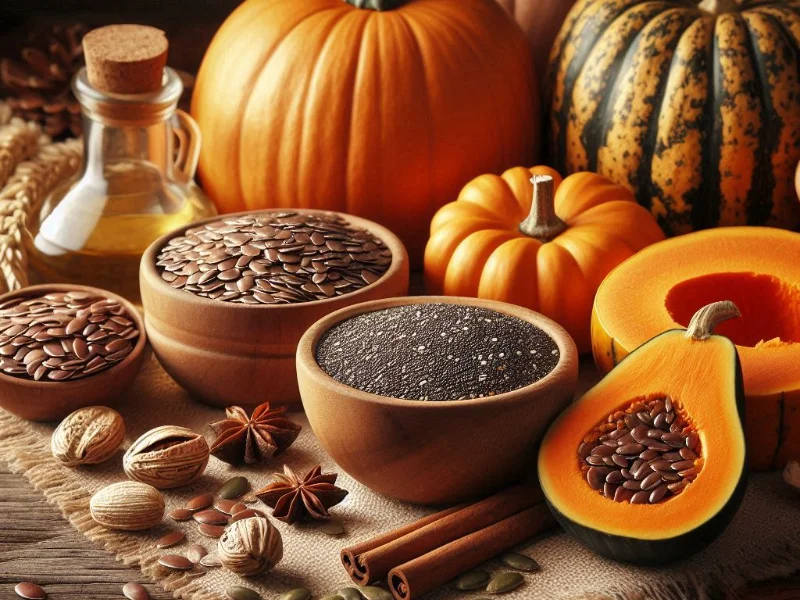 Pumpkin seeds are a healthy treat option for dogs, offering nutritional benefits that are different from sunflower seeds.
Pumpkin seeds are a healthy treat option for dogs, offering nutritional benefits that are different from sunflower seeds.
Pumpkin seeds contain nutrients and antioxidants and may help with bladder health and prevent certain cancers. Before feeding pumpkin seeds to your dog, make sure to wash, peel, and roast them. The amount of pumpkin seeds you can give your dog depends on its size. Small dogs can have 3–5 seeds, medium dogs 5–10 seeds, and large dogs 10–20 seeds per day.
Benefits Over Sunflower Seeds
1. Nutrition
Pumpkin seeds are rich in antioxidants, iron, zinc, magnesium, and other nutrients. They’re also a good source of plant-based protein and heart-healthy fats, making them a good choice for people following plant-based or low-carb diets.
2. Taste
Pumpkin seeds have a more strong, earthy flavour while sunflower seeds have a mild, nutty flavour but a tender texture.
3. Uses
Pumpkin seeds can be eaten on their own, roasted as a snack, or added to baked goods, granola, salads, or trail mix. While sunflower seeds can be eaten as a snack, or used as a topping for salads, yogurt, or cereal.
2. Chia Seeds
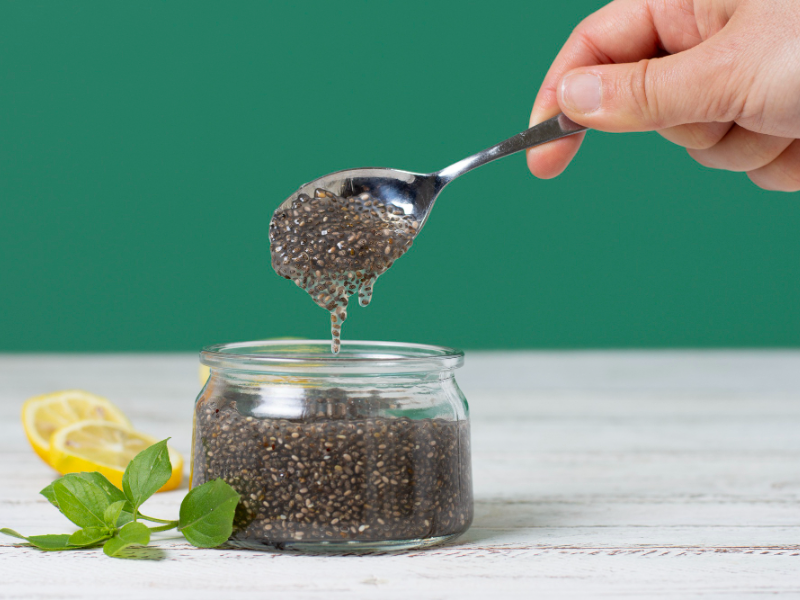 Chia seeds are a nutritious addition to your dog’s diet. Learn how they compare to sunflower seeds
Chia seeds are a nutritious addition to your dog’s diet. Learn how they compare to sunflower seeds
Chia Seeds Contain fibre, antioxidants, iron, zinc, potassium, phosphorous, and magnesium, which can help prevent constipation and keep dogs active. While chia seeds are certainly safe and non-toxic for your pet, you should be cautious about how you feed your pet these seeds. As they are small, they don’t pose a choking hazard, but soaking the seeds before serving could help ensure that they go down smoother for your pup.
Benefits Over Sunflower Seeds
1. Nutrition
Chia seeds contain more dietary fibre than sunflower seeds, but sunflower seeds have more saturated fat. Chia seeds also contain omega-3 fatty acids, protein, and many essential minerals and antioxidants.
2. Flavor
Chia seeds have a mild, nutty flavour that some say is similar to poppy seeds or alfalfa sprouts. Sunflower seeds have a mild, nutty flavour and are often roasted to enhance the flavour.
3. Texture
Chia seeds are crunchy and dense when raw, but become sponge-like when cooked. Sunflower seeds are firm but tender and can be eaten raw, roasted, or incorporated into dishes.
3. Flaxseeds
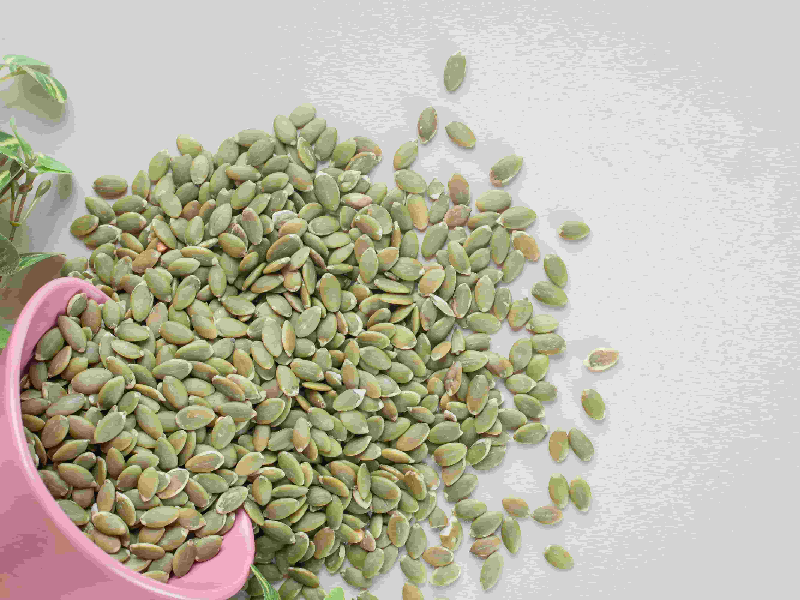 Flax seeds offer a range of health benefits for dogs
Flax seeds offer a range of health benefits for dogs
Also known as linseeds, flaxseeds contain omega-3, a fatty acid that promotes health and wellness. You can feed flaxseeds to your dog in ground or oil form, but only in moderation. Flaxseeds also contain phytoestrogens called lignans, which are similar to the hormone estrogen. The fibre in flaxseed is found in the seed coat.
Benefits Over Sunflower Seeds
1. Nutrition
Both flaxseeds and sunflower seeds are high in calcium, calories,
Dietary fibre, iron, potassium and protein. Flaxseed has more thiamin, however, sunflower seed contains more pantothenic acid and folate.
2. Calories
Both flaxseeds and sunflower seeds are high in calories. Sunflower seed has 16% more calories than flaxseed – flaxseed has 534 calories per 100 grams and sunflower seed has 619 calories.
3. Dietary Fiber
Both flaxseeds and sunflower seeds are high in dietary fibre. Flaxseed has 137% more dietary fibre than sunflower seed
How to Safely Give Your Dog Sunflower Seeds
Portion control
Sunflower seeds can be a healthy snack for dogs, but they should be given in moderation and makeup no more than 10% of a dog’s diet. The other 90% of a dog’s diet should come from a well-balanced dog food. Here are some tips for feeding sunflower seeds to dogs.
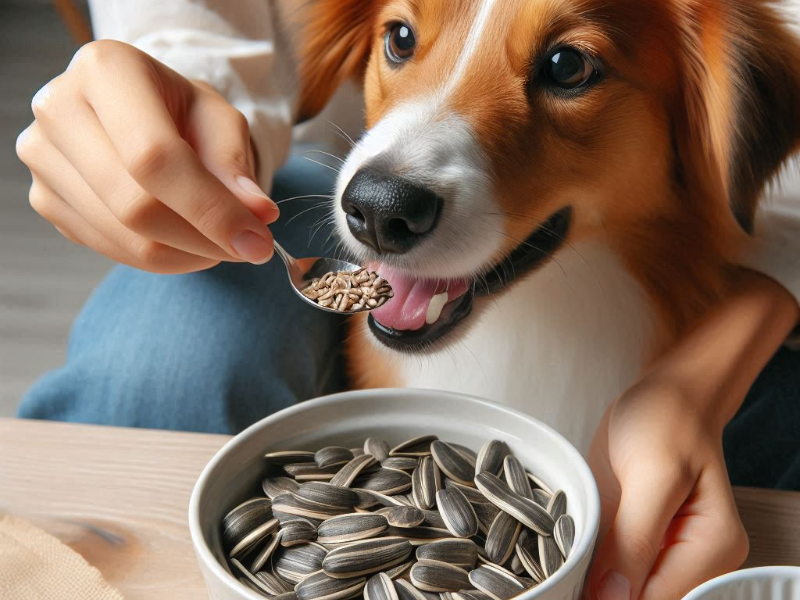 Could sunflower seeds be causing your dog’s allergies? Find out in our blog!
Could sunflower seeds be causing your dog’s allergies? Find out in our blog!
Watch For Allergies
If your dog does get ahold of sunflower seeds still in their shell, watch out for signs of digestive distress. One or two likely won’t cause an issue if your dog can swallow them easily, but a few mouthfuls could cause an upset stomach or even an intestinal blockage.
Tips For Adding Sunflower Seeds To Dog’s Food
Here are some tips on how we add sunflower seeds to your dog’s diet.
1. Start Slowly
Introduce sunflower seeds gradually to your dog’s diet, beginning with a small amount to monitor for any adverse reactions.
2. Choose the Right Seeds
Use unsalted, organic, and hulled sunflower seeds to avoid harmful additives and ensure easy digestion.
3. Mix with Regular Food
Sprinkle the seeds over your dog’s regular food or mix them with wet food to make it more appetizing.
4. Monitor Portions
Keep the portion size small—sunflower seeds should be a treat, not a significant part of their diet.
5. Grind the Seeds
Consider grinding the seeds into a fine powder before adding them to food, which can make it easier for your dog to digest and absorb nutrients.
6. Consult Your Vet
Always consult your veterinarian before introducing any new food into your dog’s diet, especially if they have any health conditions.
Conclusion
Sunflower seeds can be a nutritious and enjoyable dog treat when prepared and given correctly. By choosing unsalted, hulled, and organic seeds and introducing them gradually into your dog’s diet, you can ensure they receive the benefits without the risks. However, it’s crucial to remember that moderation is key, and sunflower seeds should only complement a well-balanced

Including sunflower seeds in your dog’s diet can be a positive choice, but you must monitor your dog’s reaction and consult with your veterinarian to ensure it’s the right fit for your furry friend.
Have you tried giving your dog sunflower seeds? Share your experiences in the comments below, and don’t forget to ask your vet for personalized advice on adding new foods to your dog’s diet







